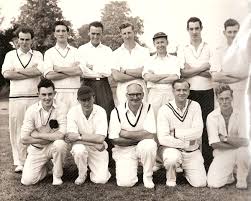A number of other words have been suggested as sources for the term "cricket". In the earliest definite reference to the sport in 1598,[5] it is called creckett. Given the strong medieval trade connections between south-east England and the County of Flanders when the latter belonged to the Duchy of Burgundy, the name may have been derived from the Middle Dutch[6] krick(-e), meaning a stick (crook); or the Old English cricc or cryce meaning a crutch or st aff.[7] In Old French, the word criquet seems to have meant a kind of club or stick.[8] In Samuel Johnson's Dictionary, he derived cricket from "cryce, Saxon, a stick".[9] Another possible source is the Middle Dutch word krickstoel, meaning a long low stool used for kneeling in church and which resembled the long low wicket with two stumps used in early cricket.[10]According to Heiner Gillmeister, a European language expert of Bonn University, "cricket" derives from the Middle Dutch phrase for hockey,met de (krik ket)sen (i.e., "with the stick chase").[11] Dr Gillmeister believes that not only the name but the sport itself is of Flemish origin.[1
aff.[7] In Old French, the word criquet seems to have meant a kind of club or stick.[8] In Samuel Johnson's Dictionary, he derived cricket from "cryce, Saxon, a stick".[9] Another possible source is the Middle Dutch word krickstoel, meaning a long low stool used for kneeling in church and which resembled the long low wicket with two stumps used in early cricket.[10]According to Heiner Gillmeister, a European language expert of Bonn University, "cricket" derives from the Middle Dutch phrase for hockey,met de (krik ket)sen (i.e., "with the stick chase").[11] Dr Gillmeister believes that not only the name but the sport itself is of Flemish origin.[1
No comments:
Post a Comment